Growing Renewable Energy Sector
The expansion of the renewable energy sector in France significantly impacts the lithium ion-battery market. As the country increases its reliance on solar and wind energy, the need for efficient energy storage solutions becomes paramount. Lithium ion batteries are increasingly utilized in grid storage applications, allowing for the stabilization of energy supply and demand. In 2025, it is estimated that the energy storage capacity in France will exceed 5 GWh, with a substantial portion attributed to lithium ion technology. This trend indicates a robust market potential, as energy storage systems become integral to managing renewable energy sources and enhancing grid resilience.
Expansion of Charging Infrastructure
The development of charging infrastructure across France is a critical driver for the lithium ion-battery market. As the number of electric vehicles on the road increases, the need for accessible and efficient charging stations becomes essential. The French government, in collaboration with private entities, is investing heavily in expanding the charging network, with plans to install over 100,000 charging points by 2025. This expansion not only alleviates range anxiety among consumers but also encourages the adoption of electric vehicles, thereby boosting the demand for lithium ion batteries. The availability of charging infrastructure is likely to play a pivotal role in shaping the future landscape of the lithium ion-battery market.
Government Incentives for Clean Energy
The French government actively promotes the adoption of clean energy technologies. This significantly influences the lithium ion-battery market. Initiatives such as tax credits and subsidies for electric vehicle (EV) purchases encourage consumers to transition to EVs, thereby increasing the demand for lithium ion batteries. In 2025, the French government allocated approximately €1 billion to support the development of sustainable battery technologies. This financial backing is expected to enhance local production capabilities and reduce reliance on imports. Furthermore, the government's commitment to achieving carbon neutrality by 2050 aligns with the growth of the lithium ion-battery market, as these batteries are essential for energy storage solutions and renewable energy integration.
Rising Consumer Awareness of Sustainability
Consumer awareness regarding environmental sustainability is on the rise in France, influencing purchasing decisions in the lithium ion-battery market. As individuals become more conscious of their carbon footprints, there is a growing preference for electric vehicles and energy-efficient products. This shift in consumer behavior is expected to drive demand for lithium ion batteries, as they are essential components of eco-friendly technologies. Market surveys indicate that approximately 70% of French consumers are willing to pay a premium for sustainable products, which bodes well for the lithium ion-battery market. This trend suggests a potential for increased sales and market penetration as manufacturers align their offerings with consumer values.
Technological Advancements in Battery Efficiency
Technological innovations play a crucial role in shaping the lithium ion-battery market. Recent advancements in battery chemistry and design have led to increased energy density and reduced charging times. For instance, the introduction of solid-state batteries is anticipated to enhance safety and performance, potentially revolutionizing the market. In 2025, the average energy density of lithium ion batteries in France is projected to reach 250 Wh/kg, a notable improvement from previous years. These advancements not only improve the performance of electric vehicles but also expand their applicability in various sectors, including consumer electronics and renewable energy storage, thereby driving market growth.















